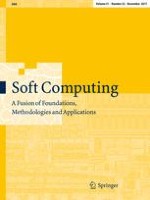27.06.2016 | Methodologies and Application
A novel table look-up scheme based on GFScom and its application
Erschienen in: Soft Computing | Ausgabe 22/2017
EinloggenAktivieren Sie unsere intelligente Suche, um passende Fachinhalte oder Patente zu finden.
Wählen Sie Textabschnitte aus um mit Künstlicher Intelligenz passenden Patente zu finden. powered by
Markieren Sie Textabschnitte, um KI-gestützt weitere passende Inhalte zu finden. powered by
